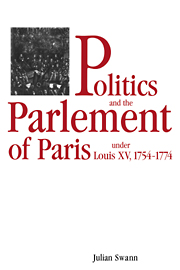Book contents
- Frontmatter
- Contents
- Dedication
- Preface
- List of abbreviations
- 1 Introduction: the Parlement of Paris
- 2 Historians and the parlements
- 3 The king and his judges
- 4 The parti janséniste and the refusal of the sacraments crisis, 1754–1756
- 5 Managing the parlements: crisis and compromise, 1756–1758
- 6 The Parlement and fiscal politics, 1756–1763
- 7 Choiseul and the politics of appeasement, 1758–1763
- 8 An unhappy peace, 1763
- 9 Defending La Chalotais: the Brittany affair, 1764–1766
- 10 In the eye of the storm, 1767–1770
- 11 The fall of the Parlement of Paris, 1770–1771
- 12 Conclusion: Maupeou and beyond
- Bibliography
- Index
4 - The parti janséniste and the refusal of the sacraments crisis, 1754–1756
Published online by Cambridge University Press: 13 March 2010
- Frontmatter
- Contents
- Dedication
- Preface
- List of abbreviations
- 1 Introduction: the Parlement of Paris
- 2 Historians and the parlements
- 3 The king and his judges
- 4 The parti janséniste and the refusal of the sacraments crisis, 1754–1756
- 5 Managing the parlements: crisis and compromise, 1756–1758
- 6 The Parlement and fiscal politics, 1756–1763
- 7 Choiseul and the politics of appeasement, 1758–1763
- 8 An unhappy peace, 1763
- 9 Defending La Chalotais: the Brittany affair, 1764–1766
- 10 In the eye of the storm, 1767–1770
- 11 The fall of the Parlement of Paris, 1770–1771
- 12 Conclusion: Maupeou and beyond
- Bibliography
- Index
Summary
On 4 September 1754, in what has been described as a great victory, the magistrates of the Parlement of Paris returned to the capital after fifteen months in exile. As part of the political settlement, personally brokered by Louis XV, the Parlement received considerable concessions in its long-running battle with the clergy over the status of the papal Bull Unigenitus and the right of the bishops to refuse the sacraments to its opponents. Central to the king's initiative was a declaration, dated 2 September, which ordered silence to be observed on the religious quarrel. The imposition of the law of silence marked the beginning of a brief period of harmony in relations between the crown and the Parlement. Yet, despite the earnest hopes of Louis XV and the diligence of his judges, the law failed to end the religious disputes that had so troubled his reign. For over two years the Parlement and the episcopate remained locked in an acrimonious quarrel about the respective rights and privileges of the temporal and spiritual powers. Exasperated by his failure, Louis XV was persuaded, in December 1756, to impose not only a new declaration concerning Unigenitus, but also a disciplinary edict on the Parlement. Rather than accept this draconian policy, a majority of the judges resigned.
In attempting to explain the difficulties which beset the law of silence, historians have traditionally divided into two broad camps.
- Type
- Chapter
- Information
- Publisher: Cambridge University PressPrint publication year: 1995



